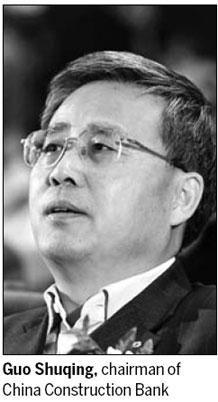China might introduce more tightening measures with credit growth standing at 13 to 14 percent next year, China Construction Bank Chairman Guo Shuqing said on Tuesday.
"The country is steering its monetary policy back to normal, We expect there will be more interest rate hikes, reserve requirement ratio hikes and central bank bills issuance to come," said Guo, leader of the nation's third-largest lender by market value, in an interview with Xinhua News Agency.
 "That will further slow monetary supply and credit growth next year," he said.
"That will further slow monetary supply and credit growth next year," he said.
As the nation's second-largest mortgage lender, the bank's policy for mortgage loans next year will be much the same as that of 2010, he said.
With the nation's consumer inflation surging to 5.1 percent in November, the government is set to place greater emphasis on price stability next year. Banking industry insiders and economists are expecting a lower lending target for 2011, after many blamed the unprecedented credit lending of the past two years for pushing up prices.
Guo said he expects China's economy to grow 8 to 9 percent next year and credit growth will slow to 13 to 14 percent, compared with 19 percent this year.
Guo's estimated credit growth will translate into some 7 trillion yuan ($1.05 trillion) in new loans next year, given that China's outstanding loans will be at more than 47.5 trillion yuan at the end of 2010.
Xia Bin, an adviser to the central bank's monetary policy committee, echoed Guo's view. Speaking at a financial forum in November, Xia said a 15 percent credit growth is enough to support China's economic expansion next year and is conducive to absorbing excessive market liquidity.
At the high-level Central Economic Work Conference, concluded earlier this month, the tone for next year's economic policy was very clear. The monetary policy will be changed from "relatively loose" to "prudent" and "flexible".
As a sign of monetary policy normalization, the central bank raised the interest rate for the first time in three years in October and raised the reserve requirement ratio by 50 basis points three times in a month.
"Normalizing credit policy would also require strict monthly or quarterly management of loan quotas throughout 2011," said Wang Tao, chief China economist at the UBS Securities.
"With the recovery in corporate earnings and rising inflationary pressure, we expect the government to set a lower credit target for 2011," she said in a research note.





